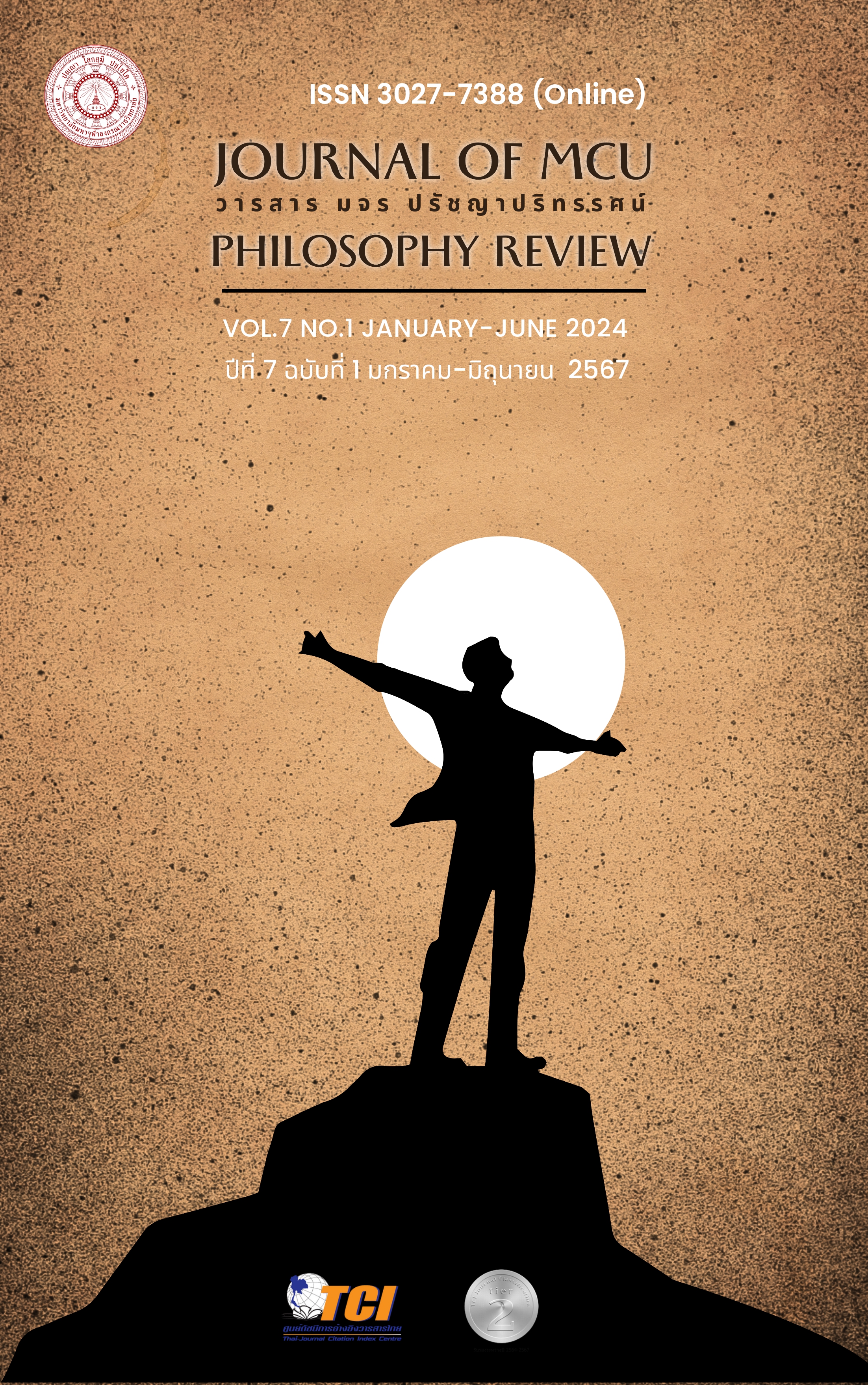The Paradigm of Educational Administration in the Context of Thai Society in the Era of New Normal
Main Article Content
Abstract
This Article aimed to determine the paradigm of educational administration in the context of Thai society in the era of New Normal. This study is document research that involves studying documents and research works related to the paradigm of educational administration, the context of Thai society during the pandemic and as it transitions into the New Normal, includes the new paradigm of educational administration in Thailand. It utilizes data collection methods gathering various sources such as reference documents, primary sources, and secondary sources, which are then examined, analyzed, and synthesized, including interviews with scholars to supplement the missing or significant content that may not be evident in accessible reference documents, afterwards the findings of the study were summarized and presented. The research results were found as follows. Based on the situation of the COVID-19 pandemic, which serves as a catalyst for transforming the educational administration paradigm towards the New Normal. It has also accelerated various megatrends, leading to a significant digital disruption as digital technologies have become integral in facilitating socially distanced lifestyles. The educational landscape in the context of Thai society in the New Normal era is characterized by volatility, uncertainty, complexity, and ambiguity. Therefore, it is necessary to adapt educational administration paradigm to align with this context. According to the research findings, the paradigm of educational administration in the context of Thai society in the era of New Normal consists of nine paradigms, namely New Normal Leadership, Collaboration, Community Engagement, Transparent Communication, Resilience, Innovation and Technology Integration, Professional Development, Scenario Planning, and Health and Safety.
Article Details

This work is licensed under a Creative Commons Attribution-NonCommercial-NoDerivatives 4.0 International License.
บทความที่ได้รับการตีพิมพ์เป็นลิขสิทธิ์ของวารสาร มจร ปรัชญาปริทรรศน์
ข้อความในบทความที่ได้รับการตีพิมพ์ในวารสาร ถือเป็นความรับผิดชอบของผู้เขียนบทความ และข้อคิดเห็นนั้นไม่ถือว่าเป็นทัศนะและความรับผิดชอบของกองบรรณาธิการวารสาร มจร ปรัชญาปริทรรศน์
References
กวินทรา จูฑะพันธุ์. (2562). การจัดการการสื่อสารกับผู้มีส่วนได้เสียของหอสมุดแห่งมหาวิทยาลัย ธรรมศาสตร์ในสถานการณ์การแพร่ระบาดของโรคโควิด-19. การค้นคว้าอิสระวารสารศาสตรมหาบัณฑิต (การจัดการการสื่อสารองค์กร) สาขาวิชาการจัดการการสื่อสารองค์กรคณะวารสารศาสตร์และสื่อสารมวลชน มหาวิทยาลัยธรรมศาสตร์.
บีบีซี นิวส์ ไทย. (2566). ไวรัสโคโรนา : อนามัยโลกประกาศให้โควิด-19 เป็น“การระบาดใหญ่”ทั่วโลก. สืบค้นข้อมูลเมื่อวันที่ 1 กรกฎาคม 2566 จาก https://www.bbc.com/thai/inter national-51838536.
ชลลดา ทองทวี. (2550). ตัวดึง-เร่งวิถี ในกระบวนการเปลี่ยนย้ายกระบวนทัศน์: กระบวนการเรียนรู้สู่สังคมแห่งสุขภาวะ. วารสารอักษรศาสตร์ มหาวิทยาลัยศิลปากร. 29, ฉบับพิเศษ ภาษาและวัฒนธรรม, 135-155.
ชลลดา ทองทวี. (2566). กระบวนทัศน์. สืบค้น 1 กรกฎาคม 2566, จาก https://www.novabizz.com/NovaAce/Paradigm.htm
ปัญจพัฒน์ ประสิทธิ์เดชสกุล. (2566). พลิกโฉมธุรกิจหลังวิกฤตโควิด-19 บทความวิจัยกรุงศรี: รีเสิร์ช อินเทลลิเจนซ์. สืบค้นข้อมูลเมื่อวันที่ 1 กรกฎาคม 2566 จาก https://www.krungsri.com/th/ research/research-intelligence/ri-post-covid-19.
ปาริชาติ พุ่มขจร และพงศ์ศักดิ์ รัตนชัยกุลโสภณ. (2563). โคโรนาไวรัส: มหันตภัยชีวภาพ จากซาร์ส และเมอร์ส ถึงโควิด-19. วารสารวิทยาศาสตร์ และเทคโนโลยี มหาวิทยาลัยมหาสารคาม, 39(6), หน้า 598-599.
ราชบัณฑิตยสถาน. (2555). พจนานุกรมศัพท์ศึกษาศาสตร์ ฉบับราชบัณฑิตยสถาน ราชบัณฑิตยสถาน 2555. กรุงเทพฯ: ราชบัณฑิตยสถาน.
สำนักงานเลขาธิการสภาการศึกษา กระทรวงศึกษาธิการ. (2564). บทวิเคราะห์การพัฒนาการศึกษาอันเป็นผลมาจากสถานการณ์โควิด-19. กรุงเทพฯ: ทริปเพิ้ลกรุ๊ป, 21.
Burcu Taskan, Ana Junça-Silva and Antonio Caetano. (2022). Clarifying the conceptual map of VUCA: a systematic review. International Journal of Organizational Analysis. 30(7): 212.
Capra Fritjof. (1986). The Concept of Paradigm and Paradigm Shift. Re-Vision, 9(1): 3.
Gronn Peter. (2008). The Future of Educational Administration. New York, NY: Routledge.
Paul H. Ray and Sherry Ruth Anderson. (2000). The Cultural Creatives: How 50 Million People are Changing the World. New York: Harmony Books.
Ritu Atheya. (2021). Changing business paradigm in COVID-19: Redefining human resource roles in VUCA world. International Journal of Multidisciplinary Education Research. 10, 6(5) January, 38.
Seher Y. Şal and Ahmet Göçen. (2022). Teachers' Views on Leadership in the New Normal. Asian Journal of Distance Education. 17, 1, 2-7.
ThankGod A. Mahel. (2021). Leadership Competencies for the Volatile, Uncertain, Complex and Ambiguous (VUCA) Environment: Challenges to Higher Education. European Journal of Humanities and Educational Advancements. 2, 5, 121.
Thomas S. Kuhn. (2544). The Structure of Scientific Revolution, แปลโดย สิริเพ็ญ พิริยจิตรกรกิจ. กรุงเทพฯ: สำนักงานคณะกรรมการวิจัยแห่งชาติ.


